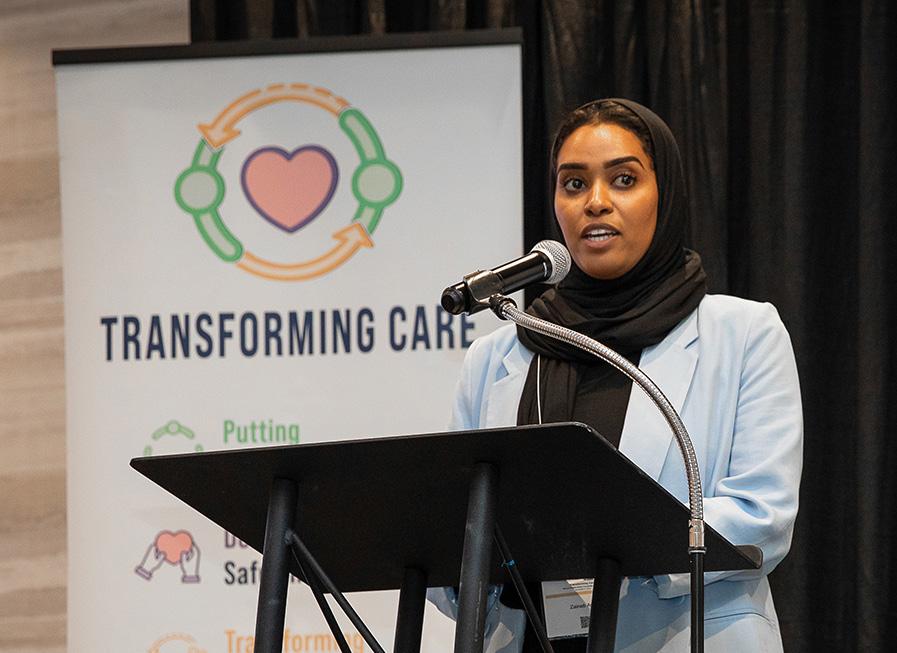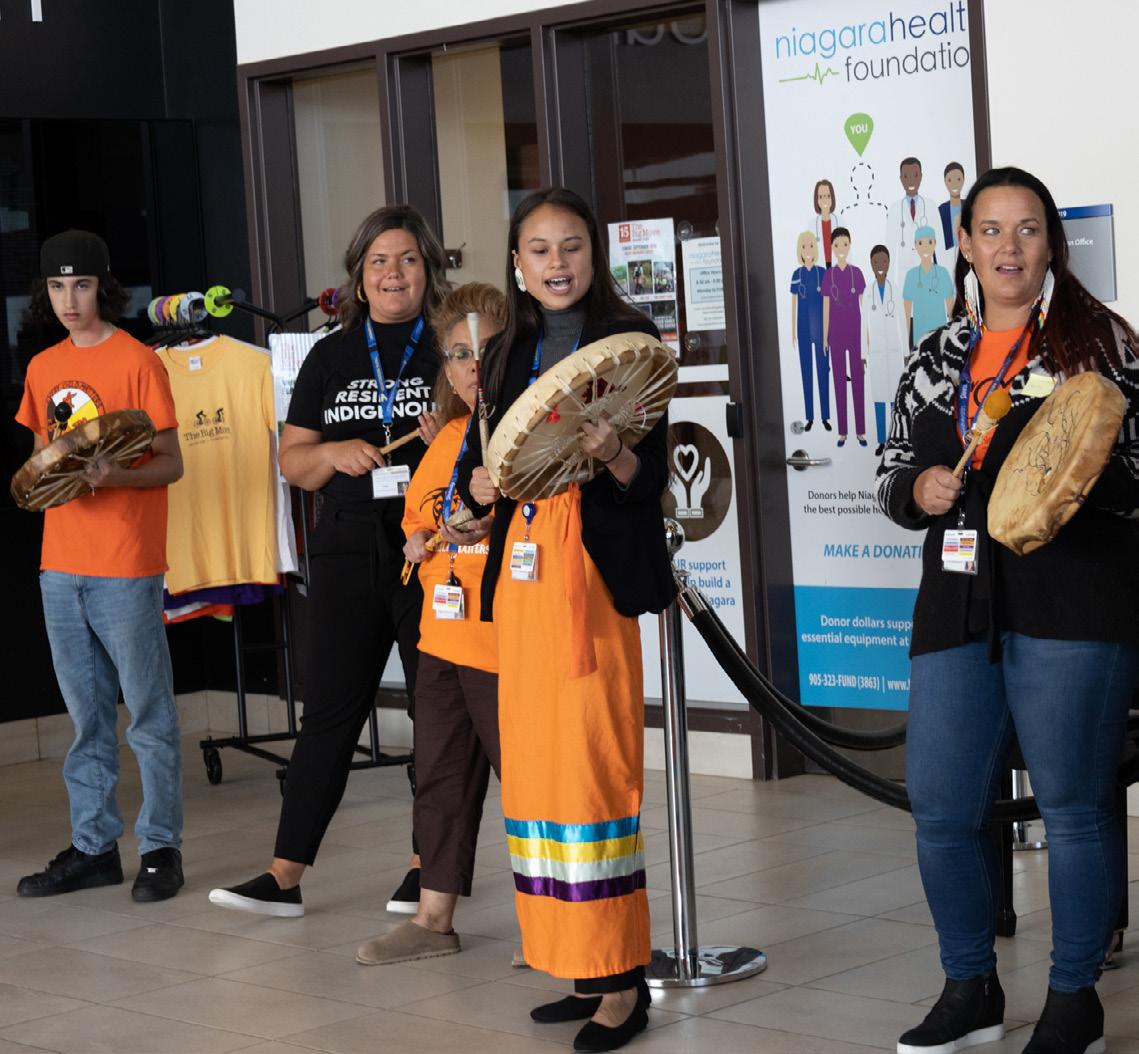HEALTH EQUITY PLAN

2025 - 2028


2025 - 2028
Health equity means all people can reach their full health potential without disadvantage due to social position or circumstances.
As defined by Health Quality Ontario, this requires fair and appropriate care that meets individual needs, regardless of location, circumstances or identity.
As a regional hospital system, Niagara Health recognizes its responsibility to provide equitable, high-quality care for all. This inaugural Health Equity Plan — an addendum to the Niagara Health 2023-2028 Strategic Plan, Transforming Care and a complement to the Indigenous Health Services and Reconciliation Plan — reinforces our commitment to embedding equity across the organization to improve health outcomes for the diverse communities we serve.
Through evidence-based initiatives, strong community partnerships, and system-wide improvements, we aim to identify and address disparities while fostering a responsive and inclusive hospital environment. This plan affirms the fundamental importance of equitable healthcare and outlines a three-year roadmap to achieving measurable, lasting impact.




Niagara Health’s commitment to equity began with its Diversity, Equity and Inclusion (DEI) Action Plan in 2021, establishing foundational practices for a respectful and inclusive environment to strengthen the workforce and organizational culture. These efforts were guided through an organizational DEI Committee that supports various educational opportunities, which includes mandatory training for all physicians and staff. These fundamentals ensure our teams reflect and understand the communities we serve and have been fundamental to building a health system rooted in respect and support.
Through collaboration with Indigenous leaders, organizations and communities across Niagara, we developed Journey to Reconciliation: Indigenous Health Services and Reconciliation Plan to guide Niagara Health’s commitment to culturally safe care. Our dedicated team of Indigenous staff promotes and implements practices that support inclusive, equitable and compassionate healthcare journeys for Indigenous patients and their families.
As Niagara Health continues to grow and learn, the Health Equity Plan marks an important step forward in our commitment to ensuring every individual in Niagara has the opportunity to reach their full health potential. With a growing and increasingly diverse population, it is essential that hospital care adapts to meet the changing needs of the communities we serve.
The Health Equity Plan was developed based on four guiding principles that ensure an evidence-informed, Niagaraspecific approach aligned with the hospital’s mandate. These principles underscore our commitment to advancing health equity by addressing the unique needs of our local population while fostering collaboration.
Our focus centres on addressing the distinct needs of the Niagara region through a deep understanding of our population's health challenges and experiences. By leveraging local data, we ensure our initiatives are tailored, relevant and responsive to the communities we serve. This approach enables us to develop solutions that reflect the real needs of the population.
Our commitment to evidence-informed care ensures that every action, intervention and program is grounded in the latest research, and best practices. By prioritizing evidence-based approaches, the plan focuses on implementing strategies that have demonstrated effectiveness, alongside ongoing evaluation to refine and respond to evolving health needs.
While our plan emphasizes initiatives that can be directly implemented within the hospital setting, we recognize health equity extends beyond clinical environments, requiring strong partnerships across the broader healthcare and social service systems. This principle ensures we leverage our expertise and resources to enhance clinical practices while working alongside community partners to drive sustainable, systemwide change.
We recognize meaningful engagement with our community is essential to ensuring this work is attuned to the lived experiences of those we serve. Our approach also builds on the strengths of our partners and prioritizes collaboration to ensure solutions leverage expertise outside the walls of the hospital and that our outcomes are sustainable.

23.3% OF NIAGARA’S POPULATION IS 65 OR OLDER
In alignment with Ontario Health’s Equity, Inclusion, Diversity, and Anti-Racism Framework, Niagara Health has identified priority populations to ensure targeted and meaningful equity efforts.
While Indigenous populations are the focus of the inaugural Indigenous Health Services and Reconciliation Plan, this Health Equity Plan focuses on two groups with growing needs in the Niagara region; older adults and individuals experiencing homelessness, alongside Black populations.
The emphasis on older adults reflects our region's unique demographics. With 3.2% of residents aged 85 and older, Niagara has the thirdhighest percentage of this age group in Canada. Additionally, 23.3% of Niagara’s population is 65 or older, compared to the provincial average of 18.5%. Over the next 25 years, the number of older adults in the region is projected to increase by 50-70%, with seniors accounting for 60% of Niagara’s population growth between 2011 and 2031 (Statistics Canada, 2021). This demographic shift has significant implications for healthcare, as Niagara residents already experience higher rates of chronic conditions—including arthritis, asthma, diabetes, and chronic obstructive pulmonary disease —
compared to the provincial average. These complex health needs not only impact patient outcomes but also place increasing demands on the healthcare system’s resources and capacity.
Homelessness further complicates healthcare access and outcomes. In Niagara, homelessness remains a growing challenge. As of December 31, 2023, 594 individuals were identified as chronically homeless, up from 472 in the previous reporting period (Niagara Region, 2024). Preliminary data suggest that more individuals are experiencing homelessness forextended periods, highlighting a rising trend in chronic homelessness.

Read Niagara Health’s inaugural Indigenous Health Services and Reconciliation Plan at NiagaraHealth.on.ca/IHSR
OLDER ADULT POPULATION INDIVIDUALS EXPERIENCING HOMELESSNESS
In Ontario, individuals experiencing homelessness face mortality rates up to four times higher than the general population and often rely on emergency services for conditions better managed through primary care.
Between 2021 and 2024, Niagara Health saw a 60.3% increase in Emergency Department (ED) visits from individuals experiencing homelessness. This trend underscores the urgent need for expanded access to primary care and supportive healthcare services across the region.
Our commitment to health equity also extends to Niagara’s Black community, aligning with provincial priorities outlined in Ontario Health’s Equity, Inclusion, Diversity, and
60.3%
INCREASE IN ED VISITS FROM INDIVIDUALS EXPERIENCING HOMELESSNESS BETWEEN 2021 & 2024
Anti-Racism Framework and the Ontario Health Black Health Plan. These frameworks, supported by clinical data, reveal significant health disparities. Across Canada, Black populations experience higher rates of chronic illnesses such as hypertension, diabetes, and cardiovascular disease, often exacerbated by systemic barriers to
culturally responsive care. In Ontario, data show disproportionate mental health challenges, delayed diagnoses, and lower rates of preventive screenings, all contributing to poorer health outcomes (Olanlesi-Aliu, Alaazi, & Salami, 2023).
Recognizing that health equity is an evolving journey, our plan remains flexible to integrate emerging evidence and community insights. While some initiatives will yield immediate improvements, others require sustained effort to embed equity across our culture, services, and systems. Our goal is to drive measurable improvements in health outcomes for all communities we serve while fostering a healthcare system rooted in respect, cultural safety, and inclusion.
1
Enhance Care for Priority Populations
3
Meet the Needs of Our Community
2
Mobilize Regional Partners for Collective Impact
4
Lay Foundation for a Sustainable Approach to Health Equity
Meet the Needs of Our Community
Build a foundation of data to understand disparities affecting Niagara’s diverse population to inform the hospital’s work.
Enhance Care for Priority Populations
Design and implement targeted interventions that promote equity in care and support better access and outcomes for underserved communities.
Mobilize Partnerships for Collective Impact
Create a network of community resources to support a whole person approach for priority populations through coordination and strong partnerships.
Lay Foundation for a Sustainable Approach to Health Equity
Build capacity for health equity through continuous education, evidence-based practice, and integrated quality improvement (QI) processes.
Purpose:
Leverage data to understand disparities affecting Niagara’s diverse population to inform the hospital’s work.
Key Actions:
• Develop and implement Niagara Health’s sociodemographic data collection plan through the Hospital Information System
• Build capacity for data analytics
• Identify opportunities for clinical improvement within the hospital system
Purpose:
Design and implement targeted interventions that promote equity and improve outcomes for underserved communities.
Key Actions:
• Introduce preventative health education and targeted campaigns to reduce risk factors and improve long-term health outcomes
• Explore social medicine by connecting seniors and patients in the ED with non-medical needs to community supports and programming
• Introduce clinical programs tailored to improve health outcomes for specific populations related to sickle cell, limb amputations and sepsis HOW WE WORK
Purpose:
Create a network of community resources to support a whole person approach for priority populations through coordination and strong partnerships.
Key Actions:
• Identify and map local community services and supports
• Forge purposeful and formal partnerships with community organizations to ensure seamless support across systems
• Develop clear referral pathways to connect patients to necessary services within and outside of the hospital
Purpose:
Build capacity for health equity through continuous education, evidence-based practice and integrated quality improvement (QI) processes.
Key Actions:
• Support continuous learning on health equity for our internal team and external partners
• Embed health equity principles into metrics of success and quality improvement plans
• Identify research initiatives to support best practices and drive evidence-based improvements in equitable care
The initiatives outlined in the Health Equity Plan mark the beginning of a meaningful, sustainable and lasting transformation.
By implementing these strategic priorities, we aspire to lead the way in delivering equitable care that meets the unique needs of our community and enhances health outcomes.
To move this work forward, we will actively engage patients and partners in identifying actionable initiatives for Niagara Health, ensuring our efforts are informed by those we serve. We will measure and report our progress, leveraging data collection, validation, and analysis to assess our impact and identify opportunities for improvement. By tracking health outcomes and patient experience surveys, we will evaluate how effectively we are addressing the needs of priority populations. Additionally, we will strengthen our collaborative partnerships to monitor the collective impact of our shared efforts.
As part of our ongoing commitment to improving care at Niagara Health, we will set clear targets for education and training, embedding health equity into key programs. This approach underscores our dedication to measurable improvements in patient care and our mission to achieve better health outcomes for all members of our community. We acknowledge that this work requires sustained effort and continuous learning, and we remain committed to making steady progress toward our goals.


Niagara Region. (2024). Niagara priority profilesNiagara Region, Ontario. Niagara Region Government. https://www.niagararegion.ca
Niagara Region Public Health. (2021). Health statistics for Niagara - Niagara Region, Ontario. Niagara Region Government. https://www.niagararegion.ca
Niagara Region. (n.d.). Community dashboard category - Niagara Region, Ontario. Niagara Region Government. https://www.niagararegion.ca
Olanlesi-Aliu, A., Alaazi, D., & Salami, B. (2023). Black health in Canada: Protocol for a scoping review. PMC10251231.
Ontario Health. (2020). Equity framework: Advancing equity and addressing health disparities in Ontario's healthcare system. Ontario Health. https://www. ontariohealth.ca/sites/ontariohealth/files/2020-12/ Equity%20Framework.pdf
Statistics Canada. (2021). 2021 Census of Population geographic summary: Niagara, Regional Municipality (RM) [Census division], Ontario. Government of Canada. https://www.statcan.gc.ca